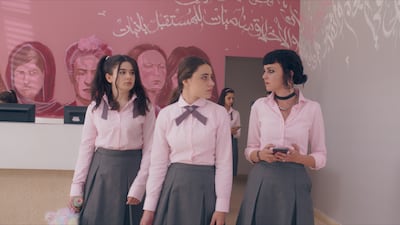Mariam, a schoolgirl at the top of her class, is lured to a dust patch behind the playground by a mysterious text message. There, next to a broken-down bus, she is accosted by two of her classmates. The girls push Mariam to the ground and start kicking her. Face down in the dirt, Mariam loses consciousness. Her head starts bleeding. Her attackers flee.
And so begins Netflix’s latest Arabic series AlRawabi School for Girls. The show, which premieres on the streaming service on Thursday, asserts its tone even before the bubblegum-pink title screen introduces it.
From the onset, AlRawabi School for Girls's mission is clear: it will go where few Arab dramas have gone before, and it incrementally pushes boundaries with each of its six episodes.

Created by Tima Shomali and Shirin Kamal, the series is set in a fictional girls' school in the Arab world and is aimed at catering to an often-overlooked demographic in Arab entertainment: young women.
“I wanted to do a project that talks about women’s stories from the perspective of women for a long while. And I wanted to do it with a team of women,” Shomali, who is also the show’s director, tells The National.
“So, as we started writing a high-school drama, it became obvious that this was the project I was waiting for."
However, the show’s honest portrayal of contemporary issues – from bullying to social alienation – make AlRawabi School for Girls a riveting watch irrespective of gender or age.
Funny, dark and bold, the show doesn’t linger on the perspective of one character for too long, instead offering a kaleidoscopic vision of the experiences unfolding at the upscale school.

“Although all the work I had done before, the comedy, the drama and the TV, has a special place in my heart, I feel like it was all preparing me for this project,” says Shomali, whose previous works include the 2013 series FemaleShow.
“I wanted AlRawabi School for Girls to be of a very different calibre. It needed a lot of preparation, a lot of hard work, and I am proud of us, as a team, of how we pulled through, especially during this Covid-19 situation. It was a life-changing experience.”
But what is a well-thought-out show without a good cast to back it up? Most of the young actresses in AlRawabi School for Girls are making their on-screen debut in the Netflix series, but you wouldn’t know it from their performances.

The cast breathe new life into high-school archetypes, with their sharp individualism upending the usual tropes we’ve come to expect in teen dramas.
Andria Tayeh gives a layered performance as the cunning and resilient Mariam, who decides to enact an elaborate revenge plan against her tormentors. She is joined by two of her friends: the bubbly and affable Dina, played by Yara Mustafa, and the brooding nonconformist Noaf, played by Rakeen Saad.
But that’s not to say you’ll totally be on their side. The show makes sure to give each character their due, so that you’ll even find something to admire in Mariam’s bullies: a Mean Girls-esque trio featuring the cold and calculating Layan, played by Noor Taher; the forthright and subversive Rania, played by Joanna Arida; and their confidant and enabler Roqayya, played by Salsabiela A.
“They were so genuine,” Shomali says. “All of them, apart from Rakeen, graduated from high school not too long ago. So those experiences were still fresh and I wanted that to show in their acting.”
Ahmed Sharkawi, director of Arabic Original Series at Netflix, says the streaming service was aware that some who watch the show might be going through experiences similar to its characters. That is why each episode ends by directing viewers to an online bullying information resource, wannatalkaboutit.com.
“It’s a Netflix site that provides mental health resources for topics such as bullying,” he says. “We know the show touches on some sensitive subjects, but we welcome that because it creates some kind of dialogue.”
Besides bullying, the series explores the difficulties in balancing societal expectations against personal aspirations, as well as the experiential gap between students and their parents and teachers.
These universal themes, Sharkawi says, will help the show to gain traction beyond the Arab world.
“One of the great things that Tima and Shirin did in the show was break the mould of the two-dimensional female character. None of the characters are fully evil, nor are they fully good. So this kind of shifting perception is very enriching.”
Sharkawi says that Netflix, with its previous Arabic series including Paranormal and Abla Fahita: Drama Queen, is always looking for good ideas from the Arab world to bring to the streaming platform.
“The Arab world is rich in stories,” he says. “We first look at an idea, see if it’s broad enough, entertaining enough, and whether it will engage Arab audiences and has the potential of transcending borders, creating connections with a global audience.
"This is when we succeed; when we bring Arab entertainment, Arab voices to the global arena.”


